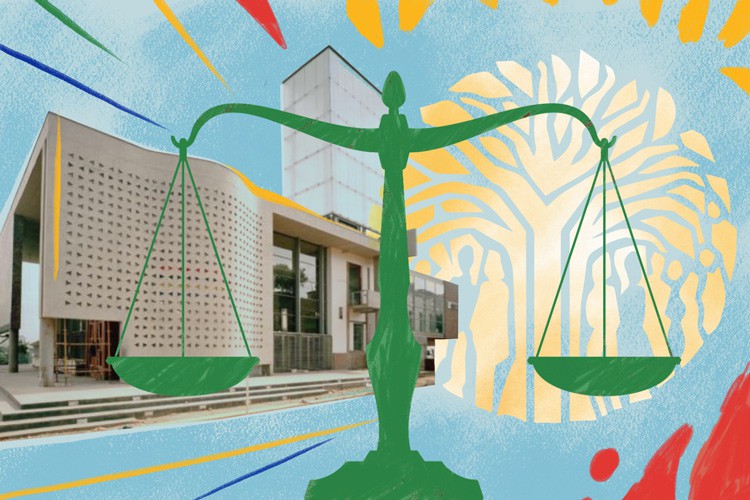Justice delayed is justice denied: Court frees man convicted of rape after it took seven years to prosecute him
Magistrate and prosecutor “deserve censure of the strongest kind” rule two KZN judges
Illustration: Lisa Nelson
- Two KwaZulu-Natal judges have overturned the conviction of a young man accused of rape.
- From arrest to conviction the case took seven years and the accused appeared 46 times in court.
- The accused was 17 when the offence was committed.
- The judges said the blame for the “simply astounding” delays lay with the conduct of the presiding magistrate and prosecutor.
Two KwaZulu-Natal judges have overturned the conviction and effective 15-year prison sentence of a young man accused of raping an 11-year-old, because of delays in his trial.
Judges Rishi Seegobin and Rashid Vahed said it was “simply astounding” that it had taken seven years and 46 court appearances from the time of Sihle Kunene’s arrest to his conviction, when the relatively uncomplicated matter should have been finalised in a couple of weeks.
They said the blame could be laid squarely on the presiding magistrate and prosecutor, who “deserved censure of the strongest kind” for disregarding the fair trial rights of the accused and the rights of the complainant.
The appeal matter was heard in April this year. While neither the defence nor the state raised the issue of the right to a speedy trial, it was agreed that it was a matter which should not be ignored by the judges.
After hearing the argument, the judges ordered Kunene’s immediate release from prison, saying they would give their reasons later. These were handed down this month.
Kunene was 18 at the time of his arrest in 2013 when he made his first appearance in the Vryheid Regional Court. He was charged with raping an 11-year-old on several occasions in 2012, when he was 17. He was released on warning. He was convicted in January 2019 of two counts of rape and sentenced to an effective 15 years.
The judges gave a detailed history of the seven years of delays and the reasons for these. They noted that the actual trial had only taken up eight days of the 46 occasions that the matter was before the court.
“The Constitution provides that every accused person has a right to a fair trial which includes the right to have their trial begin and conclude without unreasonable delay,” the judges said.
“The detailed history shows that the delays were occasioned by what might rightly be termed as systematic delays and the periods of time were lost mainly because of the non-availability of the presiding magistrate and or the absence of witnesses.”
The accused had been present on each occasion.
The prejudice was self-evident, the judges said.
Two years and eight months elapsed from the time of Kunene’s arrest until the trial commenced in May 2015, when the complainant began her testimony.
Another two and half years passed until the matter resumed in July 2017.
The prosecutor then decided that the complainant should begin her evidence afresh.
The consequence of this was that her evidence was now at variance with what she had testified on the first occasion in two crucial aspects: the number of times she was raped, and what she had been wearing at the time.
“She maintained she had identified him by his voice. There was no evidence to test the reliability of voice identification. The room was dark and she never saw him.
“She said the rapes were committed on a small bed also occupied by two other children. How probable that was was never explored.”
“Bearing in mind that the charges in this matter were of a sexual nature involving a young girl and a young offender, there was an overall duty, not only on the court, but also on the prosecution, to ensure the trial commenced and ended within the shortest time possible.”
“The failure for this must be placed squarely at the doors of the magistrate and the prosecution. There was severe prejudice to both the accused and the young complainant.”
“It was not a complex matter. Four witnesses were called by the state and only the accused testified in his defence. It could have been finalised within a week or two. That it took seven years is simply astounding,” the judges said.
The judges said rape and other sexual offences had become endemic and there could be no confidence in a justice system that made a mockery of the rights of not only accused people, but also the victims.
“The conduct of the magistrate and the prosecutors involved requires the censure of the strongest kind. The delay was unreasonable in the extreme,” they ruled.
Support independent journalism
Donate using Payfast

Don't miss out on the latest news
We respect your privacy, and promise we won't spam you.
Next: Charlotte Maxeke partly reopened but only for cancer outpatients
Previous: Triangle Project concerned by delayed hate crimes bill
© 2021 GroundUp. This article is licensed under a Creative Commons Attribution-NoDerivatives 4.0 International License.
You may republish this article, so long as you credit the authors and GroundUp, and do not change the text. Please include a link back to the original article.
We put an invisible pixel in the article so that we can count traffic to republishers. All analytics tools are solely on our servers. We do not give our logs to any third party. Logs are deleted after two weeks. We do not use any IP address identifying information except to count regional traffic. We are solely interested in counting hits, not tracking users. If you republish, please do not delete the invisible pixel.

